For many dog lovers, the joy of companionship is often tempered by the reality of shedding fur and potential allergies. If you dream of a furry friend but dread the constant cleanup or suffer from sniffles, you’re in luck! There’s a wonderful world of cutest small breed dogs that don’t shed, or shed minimally, offering adorable personalities and low-allergen coats. These charming canines prove that big love comes in small, tidy packages. From playful companions to serene lap dogs, finding the right match means understanding their unique traits and grooming needs. Let’s explore some of the most endearing small dog breeds that are perfect for keeping your home cleaner and your allergies at bay.
Affenpinscher
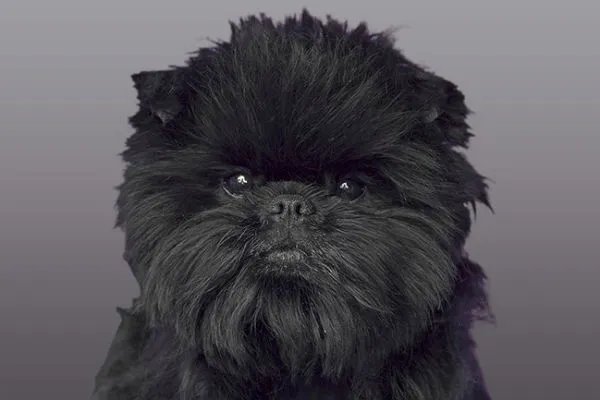 Affenpinscher dog with a dark, wiry, low-shedding coat and a charming, monkey-like expression.
Affenpinscher dog with a dark, wiry, low-shedding coat and a charming, monkey-like expression.
The Affenpinscher, whose name means “monkey-like terrier,” perfectly embodies its intelligent and captivating appearance. Despite its petite size, this adorable Toy breed is remarkably fearless. With their keen eyes and watchful nature, Affenpinschers are not only alert companions but also boast a wiry coat that sheds very little and has almost no distinctive “doggy” odor. Keeping an Affenpinscher looking shaggy yet neat simply requires a twice-weekly brushing with a slicker brush and comb. Known for their delightful sense of humor, these low-maintenance little canines bring endless joy.
Basenji
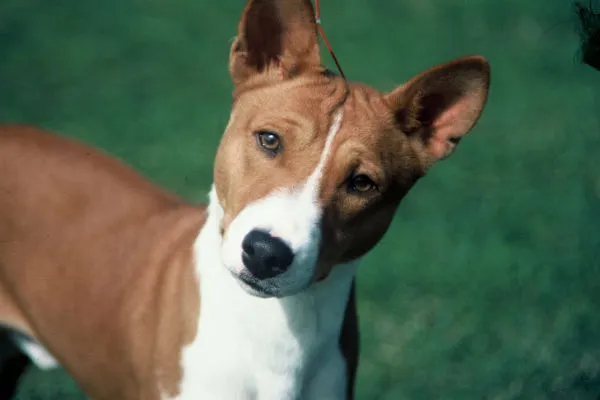 Graceful Basenji dog with a short, fine, low-shedding coat, known for its elegant stance.
Graceful Basenji dog with a short, fine, low-shedding coat, known for its elegant stance.
For those who adore the elegance of hounds but wish to avoid their typical shedding and distinctive scent, the Basenji could be the ideal small breed dog that doesn’t shed excessively. This unique breed sheds very minimally, and its short, fine coat requires little more than occasional brushing to maintain its sleek appearance. Basenjis are also famously quiet, making them an excellent choice for apartment living, provided they receive sufficient daily exercise and playtime. Their clean habits and captivating presence make them truly charming companions.
Bichon Frise
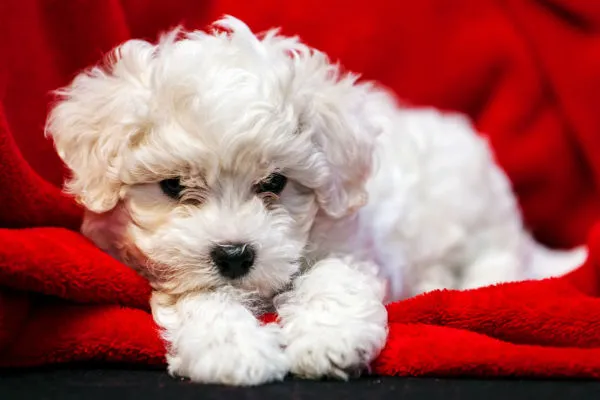 Fluffy white Bichon Frise dog with a powder-puff appearance, known for being non-shedding and hypoallergenic.
Fluffy white Bichon Frise dog with a powder-puff appearance, known for being non-shedding and hypoallergenic.
The Bichon Frise is the epitome of a non-shedding small dog breed, making them a top choice among cutest small breed dogs that don’t shed for allergy sufferers. These playful and affectionate pups are truly ideal companions. However, their stunning powder-puff appearance isn’t maintenance-free. A Bichon Frise’s hair grows continuously, demanding frequent grooming, daily brushing, and regular baths to prevent matting and keep their pristine look. Their joyful demeanor and cotton-ball charm make the grooming effort worthwhile.
Bolognese
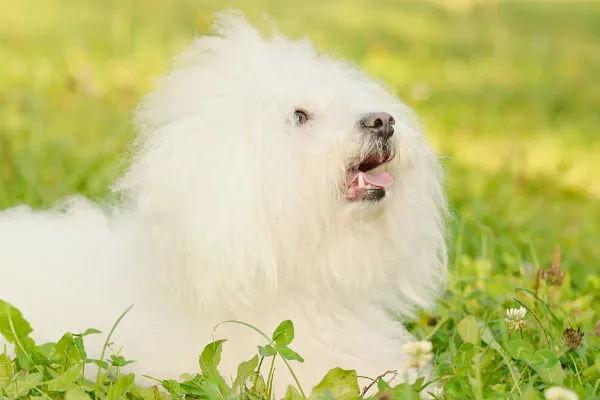 Sweet Bolognese dog with a distinctive long, fluffy white coat, a non-shedding small breed.
Sweet Bolognese dog with a distinctive long, fluffy white coat, a non-shedding small breed.
Similar to the Bichon Frise, the charming Bolognese boasts a distinctive fluffy coat composed of hair, not fur, which means they are a wonderful non-shedding option. While these lovable lap dogs don’t shed, their dead hair must be brushed out regularly, requiring daily grooming to maintain their soft, appealing look. Bolognese dogs are known for their gentle and devoted nature, making them perfect cuddle buddies for those seeking a low-shedding, adorable companion.
Brussels Griffon
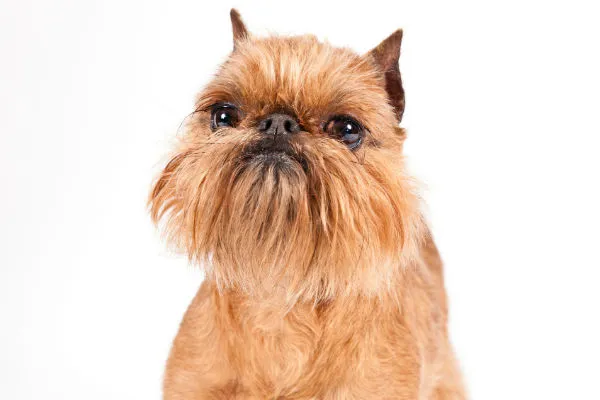 Expressive Brussels Griffon dog with a wire-haired, low-shedding coat, sitting attentively.
Expressive Brussels Griffon dog with a wire-haired, low-shedding coat, sitting attentively.
Despite their small stature, the Brussels Griffon is a sturdy and resilient little dog, not one that requires constant pampering. Both the smooth-coated and rough-coated varieties of this cute small breed dog that doesn’t shed much thrive with regular grooming and are minimal shedders. Their compact size means that a daily walk combined with indoor play is usually enough to meet their exercise needs. These loyal little dogs are happiest with families who can offer frequent companionship, their expressive faces adding to their undeniable charm.
Chinese Crested
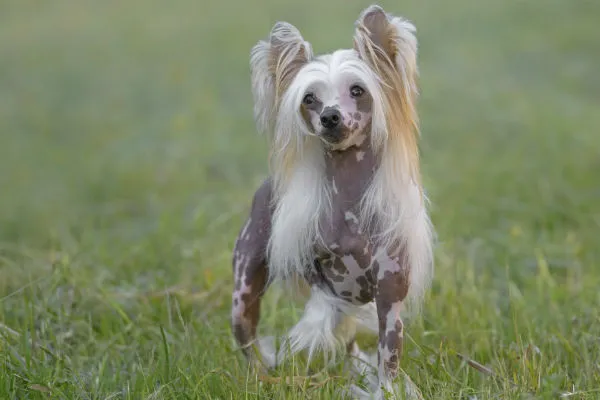 Distinctive Chinese Crested dog, showcasing a unique appearance with hair on its head, tail, and feet.
Distinctive Chinese Crested dog, showcasing a unique appearance with hair on its head, tail, and feet.
For a truly unique approach to avoiding shedding, consider the Chinese Crested, one of the most distinctive small breed dogs that don’t shed. This breed comes in two intriguing coat types: hairless and powderpuff. The hairless variety has charming tufts of hair on its head, tail, and feet, while the powderpuff is covered in a soft, fine coat that sheds very minimally. Hairless dogs, like the Chinese Crested, require extra care for their delicate skin, needing protection from sun and cold, and are prone to skin irritations. Their exotic appearance and affectionate nature are truly captivating.
Coton De Tulear
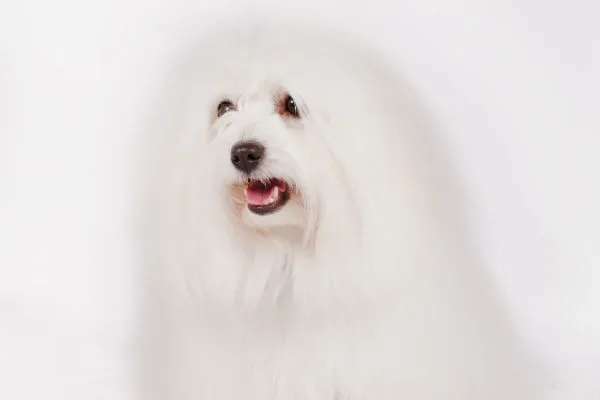 Cuddly Coton de Tulear dog with a long, fluffy, white coat, known for being hypoallergenic and low-shedding.
Cuddly Coton de Tulear dog with a long, fluffy, white coat, known for being hypoallergenic and low-shedding.
The Coton de Tulear boasts a distinctive, long, fluffy coat that is celebrated as hypoallergenic, making it an excellent choice for allergy sufferers and anyone seeking a cute small dog that doesn’t shed. While their luxurious coat does demand daily grooming to prevent tangles and maintain its beautiful texture, their lighthearted and gentle natures make every effort worthwhile. These charming “Royal Dog of Madagascar” bring endless joy and a touch of fluffy elegance to any home.
Havanese
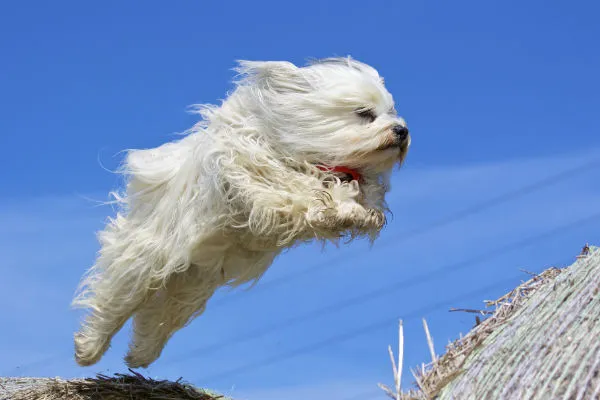 Playful Havanese dog with a long, silky, non-shedding coat, full of spunky charm.
Playful Havanese dog with a long, silky, non-shedding coat, full of spunky charm.
These native Cuban dogs, known for their patented spunky charm, also offer owners a coveted non-shedding coat. This means less time spent lint rolling furniture and more quality time romping with your playful Havanese. To keep their beautiful, flowing coats clean and healthy, weekly brushing and regular baths are essential. The Havanese is a truly endearing companion, known for its intelligence and cheerful disposition, making them one of the cutest small breed dogs that don’t shed.
Maltese
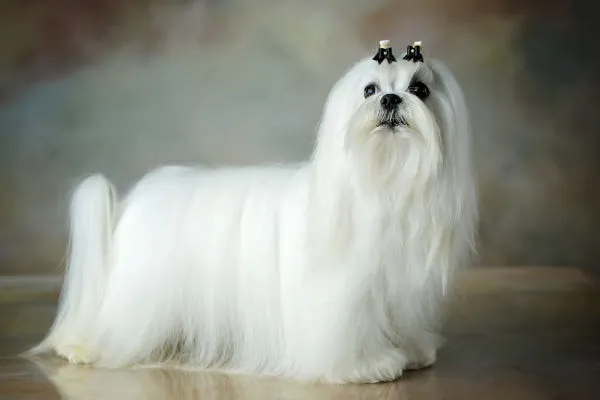 Elegant Maltese dog with a long, flowing white coat, a beloved low-shedding lap dog.
Elegant Maltese dog with a long, flowing white coat, a beloved low-shedding lap dog.
Maltese dogs have captivated human hearts for an impressive three millennia. This ancient dog breed from Malta has remained largely unchanged over the past 28 centuries, perhaps in part due to their long, beautiful white coats that shed very little, solidifying their status as an ideal lap dog. While their luxurious coats require regular brushing to prevent mats from forming, and occasional baths to keep them sparkling clean, their gentle and elegant presence makes them one of the most beloved and cutest small breed dogs that don’t shed.
Lhasa Apso
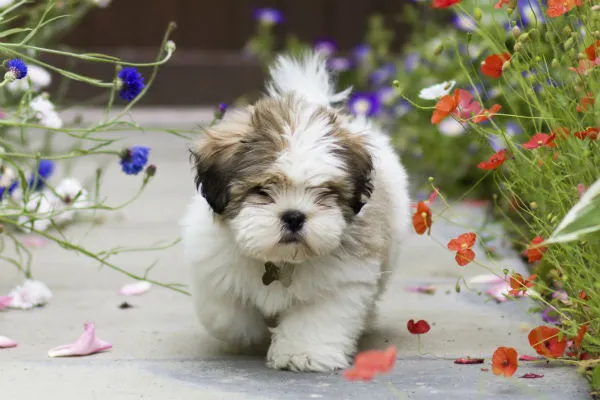 Regal Lhasa Apso dog with a long, flowing coat and a calm yet alert expression.
Regal Lhasa Apso dog with a long, flowing coat and a calm yet alert expression.
This charming small dog breed originating from Tibet makes an exceptional companion. Known for being calm yet playful, the Lhasa Apso enjoys both brisk walks and peaceful moments resting in their owner’s lap. Lhasa Apsos are wonderfully non-shedding, but their magnificent coats do require consistent maintenance. Many owners choose to keep their Lhasa Apsos in a convenient “puppy cut” to minimize the need for daily grooming and brushing of their long, flowing hair. Their noble demeanor and affectionate loyalty are truly endearing.
Miniature Schnauzer
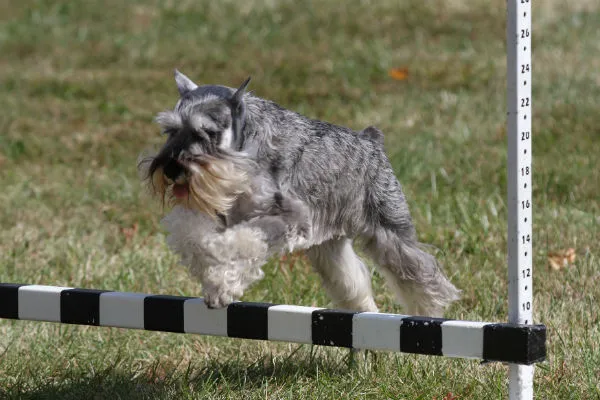 Alert Miniature Schnauzer dog with a distinctive wiry coat and charming beard.
Alert Miniature Schnauzer dog with a distinctive wiry coat and charming beard.
The Miniature Schnauzer is a smart, highly trainable, and wonderfully cheerful little dog that strongly resembles its Standard Schnauzer cousin. This cute Terrier breed sheds very little, making them a fantastic choice for those seeking a low-shedding companion. Their adaptability allows them to thrive equally well in a bustling city apartment or a sprawling country home, as long as their beloved people are close by. To keep Miniature Schnauzers looking their best, weekly brushing and regular professional grooming are essential parts of their routine.
Poodle
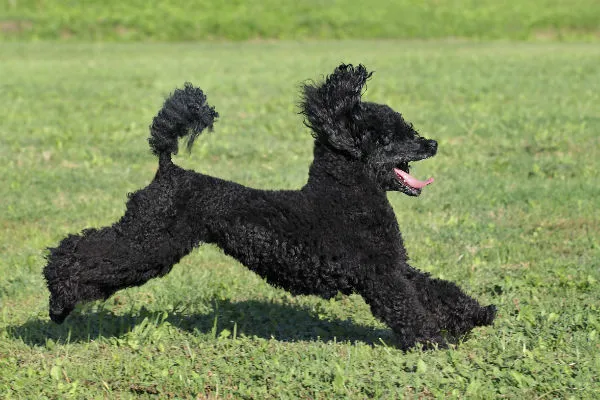 Elegant Poodle in a classic stance, showcasing its curly, non-shedding, and hypoallergenic coat.
Elegant Poodle in a classic stance, showcasing its curly, non-shedding, and hypoallergenic coat.
When people think of small dogs that don’t shed, the Poodle often comes to mind, and for good reason. Poodles are famously non-shedding and hypoallergenic, making them a perfect fit for allergy sufferers. Miniature and Toy Poodles offer these desirable qualities in intelligent, petite packages, differing only in size from their Standard counterparts. All Poodles are highly intelligent, which makes them remarkably easy to train. They are an active, proud breed whose curly hair requires regular professional grooming to maintain its iconic look.
Scottish Terrier
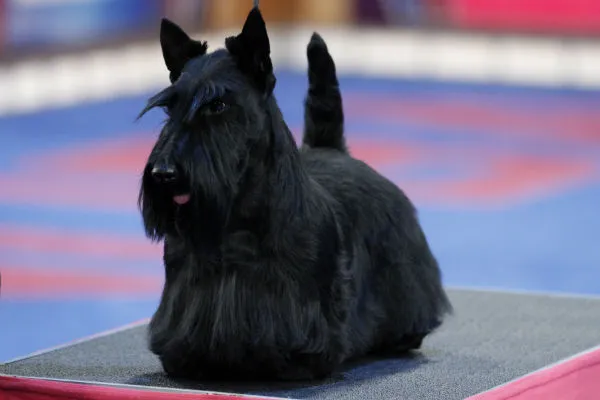 Bold Scottish Terrier dog with a rugged, wiry, low-shedding coat and a confident expression.
Bold Scottish Terrier dog with a rugged, wiry, low-shedding coat and a confident expression.
The Scottish Terrier, affectionately known as a Scottie, is a Terrier breed renowned for its boldness, confidence, and surprisingly big personality for its size. Their wiry, weather-resistant coat sheds very little, making them a great option among cutest small breed dogs that don’t shed. While they are low-shedding, Scotties do need regular brushing, professional grooming, and occasional hand-stripping to keep their coats healthy and maintain their distinctive silhouette. These clever and independent dogs possess strong prey drives, so owners must exercise caution around smaller animals.
Shih Tzu
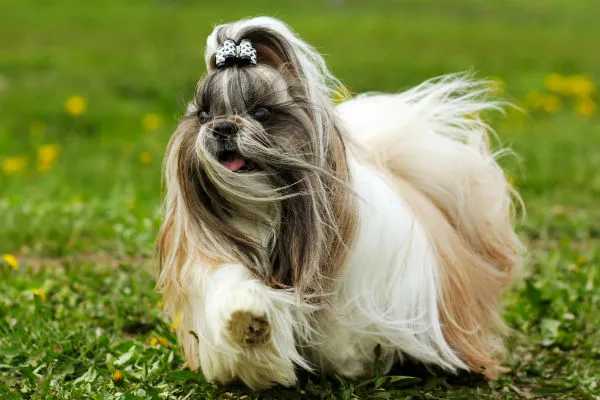 Majestic Shih Tzu dog with a long, silky, low-shedding coat and a proud demeanor.
Majestic Shih Tzu dog with a long, silky, low-shedding coat and a proud demeanor.
The Shih Tzu is another breed with a long and illustrious pedigree, revered as the favored house pet of the Tang Dynasty. These “little lion dogs” come in a beautiful array of colors and patterns. Their long, silky hair is remarkably low-shedding and looks exceptionally regal when brushed out, truly befitting their royal ancestry. This adorable Toy breed is sturdy and lively, often described as having an arrogant carriage due to their proudly held heads and curling tails. Bred solely to be house pets, their gentle, trusting nature makes them truly exceptional companions.
West Highland White Terrier
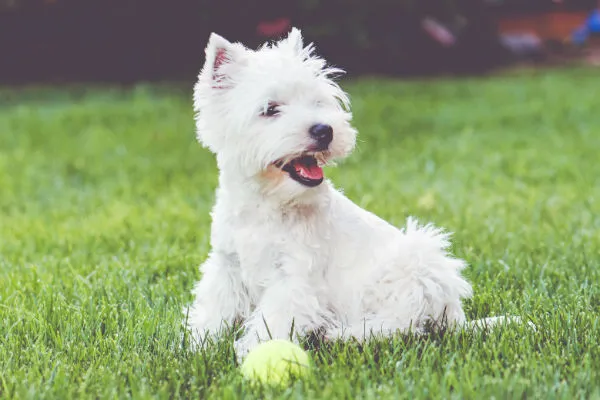 Energetic West Highland White Terrier (Westie) with its characteristic coarse, white, low-shedding coat.
Energetic West Highland White Terrier (Westie) with its characteristic coarse, white, low-shedding coat.
The coarse, brilliant white hair of the West Highland White Terrier, affectionately known as a Westie, sheds very little. This sturdy and intelligent little dog is loyal, cheerful, and incredibly entertaining. Westies are naturally curious with moderate energy levels and possess an independent streak common among all Terriers, which can sometimes make training a fun challenge. Their bright personalities and charming appearance make them one of the cutest small breed dogs that don’t shed much and are beloved by many.
Xoloitzcuintli
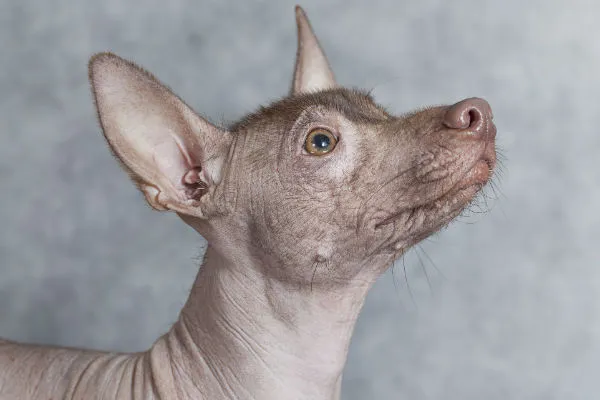 Unique Xoloitzcuintli (Mexican Hairless) dog, showcasing its distinctive hairless skin with a small tuft of hair on its head.
Unique Xoloitzcuintli (Mexican Hairless) dog, showcasing its distinctive hairless skin with a small tuft of hair on its head.
Also known as the Mexican Hairless, the Xoloitzcuintli is an ancient and rare breed of dog that can be either hairless or coated. Hairless varieties typically retain a charming small amount of hair on their heads, while the coated variety features a very short, fine coat that sheds minimally. As with any hairless breed, the Xolo requires a little extra attention to their skin to protect them from the elements. Xolos make attentive watchdogs and wonderfully affectionate companions, and while they enjoy physical activities like walks and vigorous play, they are also celebrated for their tranquil personality within the home.
Yorkshire Terrier
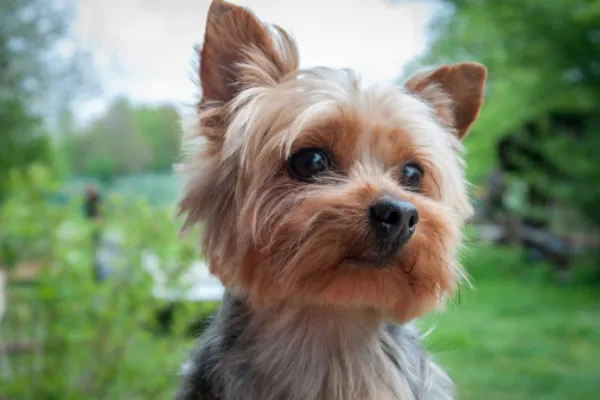 Sprightly Yorkshire Terrier (Yorkie) with a long, silky, non-shedding coat and a confident expression.
Sprightly Yorkshire Terrier (Yorkie) with a long, silky, non-shedding coat and a confident expression.
Sprightly, full of personality, and undeniably affectionate, the Yorkshire Terrier, often simply called a Yorkie, is a Toy breed packed with character. These spunky lap dogs are incredibly popular, and for good reason. Yorkshire Terriers do not shed, and their silky coats are absolutely beautiful when brushed out daily – a task made easy by their tiny size. Don’t be fooled by their regal carriage; Yorkies have working-class roots. These fearless terriers once hunted rats in English clothing mills, though today they are just as content sitting on their owner’s lap as they are playfully chasing a toy. Their big personality in a tiny package makes them one of the cutest small breed dogs that don’t shed.
Other Charming Small, Low-Shedding Terrier Breeds
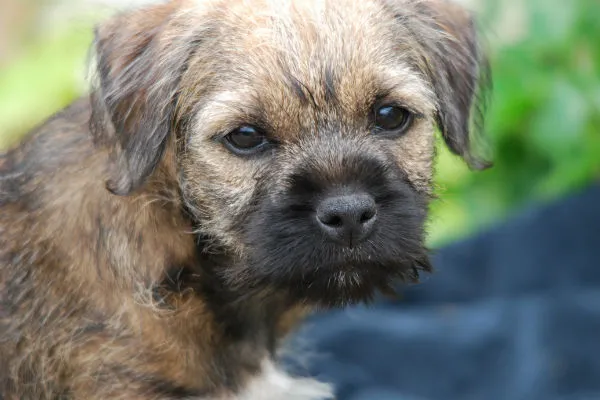 Alert Border Terrier dog with a wiry, low-shedding coat, looking curiously.
Alert Border Terrier dog with a wiry, low-shedding coat, looking curiously.
The Terrier group is a fantastic resource for discovering cute small breed dogs that don’t shed or shed minimally. Wiry- and coarse-haired Terriers naturally shed less than many other breeds, making them ideal small dogs for individuals who prefer a cleaner home. Beyond the ones highlighted above, other notable non- or low-shedding Terrier breeds include the Border Terrier, Cairn Terrier, Lakeland Terrier, Norfolk Terrier, and Sealyham Terrier, each offering unique charms and spirited personalities.
There are numerous delightful small breed dogs that don’t shed, but choosing a non-shedding dog doesn’t mean zero maintenance. Each of these charming breeds has specific grooming requirements and personality traits. Take the time to carefully research any potential breed to ensure it perfectly matches your lifestyle, home environment, and personal preferences. To ensure your new companion is healthy and well-adjusted, always consider adopting from a reputable rescue or purchasing from a responsible breeder. Provide your dog with a high-quality diet and ensure regular veterinary checkups for a long, happy, and healthy life together.
Further Reading:
- AKC Marketplace: For information on specific dog breeds and reputable breeders.
